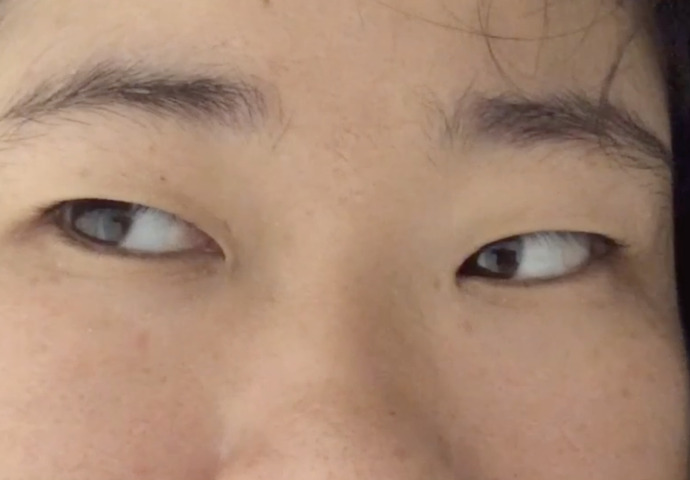Description
A 21-year-old woman presented with acute onset vertigo and nausea. She had a prior episode of upper respiratory tract infection and no hearing loss. Physical examination revealed left-beating spontaneous nystagmus in primary gaze (figure 1 and video 1). The nystagmus decreased in right gaze and increased in left gaze. Brain MRI was normal. Right vestibular neuritis was diagnosed and her symptoms improved on follow-up at 2 weeks later.
Figure 1.
Alexander’s law in vestibular neuritis. The left-beating spontaneous nystagmus increased in gaze left and decreased in gaze right.
Video 1.
Acute vestibular syndrome is vertigo, nausea or vomit that appears acutely over seconds to hours and lasts for days to weeks.1 It is important to distinguish between peripheral vertigo such as vestibular neuritis and central vertigo such as cerebellar infarction.1 Alexander’s law refers to spontaneous nystagmus that occurs after an acute unilateral vestibular loss. In the case of peripheral nystagmus, intensity of nystagmus is enhanced when staring in the direction of fast-phase otherwise reduced when staring at the opposite side of the fast-phase.2
Learning points.
Acute vestibular syndrome is vertigo, nausea or vomit that appears acutely over seconds to hours and lasts for days to weeks.
It is important to distinguish between peripheral vertigo, such as vestibular neuritis and central vertigo, such as cerebellar infarction.
Alexander’s law refers to spontaneous nystagmus that occurs after an acute unilateral vestibular loss.
Footnotes
Twitter: @K
Contributors: KS cared for the patient and wrote the report. KS and MI read and approved the final version of the report.
Funding: The authors have not declared a specific grant for this research from any funding agency in the public, commercial or not-for-profit sectors.
Competing interests: None declared.
Patient consent for publication: Obtained.
Provenance and peer review: Not commissioned; externally peer reviewed.
References
- 1.Tsang BKT, Chen ASK, Paine M. Acute evaluation of the acute vestibular syndrome: differentiating posterior circulation stroke from acute peripheral vestibulopathies. Intern Med J 2017;47:1352–60. 10.1111/imj.13552 [DOI] [PubMed] [Google Scholar]
- 2.Robinson DA, Zee DS, Hain TC, et al. Alexander's law: its behavior and origin in the human vestibulo-ocular reflex. Ann Neurol 1984;16:714–22. 10.1002/ana.410160614 [DOI] [PubMed] [Google Scholar]



